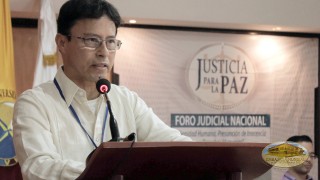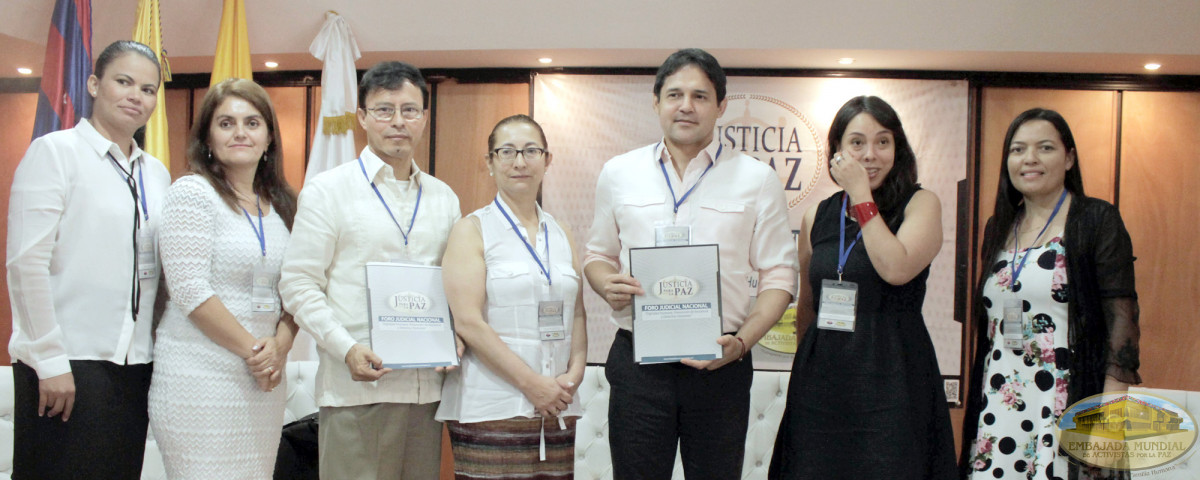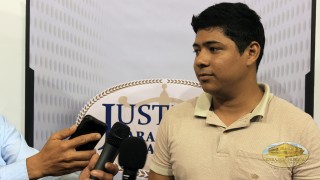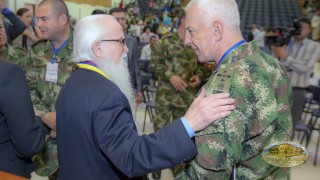Judicial Forum Promotes Transitional Justice for a Peaceful Colombia
Academic authorities and members of the high government, centered their analysis on the stage of post-conflict
Colombia, the country in the western hemisphere that has had the longest armed conflict in history, it is currently in the process of peace through dialogues and negotiations that began late 2012, between the Government and the guerrilla of the Revolutionary Armed Forces of Colombia (FARC), actors of conflict. This situation has produced countless statements, analysis and discussions regarding the best way to address the post-conflict stage.
The Global Embassy of Activists for Peace (GEAP), in partnership with the Law Program of the University of Magdalena, organized an event for the presentation of the proposals based on the most suitable judicial mechanisms to address this stage that runs nationwide; for this, they developed the Forum “Human Dignity, Presumption of Innocence and Human Rights.”
The Forum constitutes one of the lines of action of the Project “Justice for Peace,” which the GEAP promotes internationally, with the aim of creating spaces for dialogue and reflection to generate constructive critical thinking about the criminal policy, human rights, justice and strengthening the culture of peace.

On this occasion, the event promoted transitional justice as an extraordinary judicial mechanism to achieve a balance between justice and peace in post-conflict situations, as well as the characteristics that must be met for its effective implementation, post-conflict and peace process in Colombia as its central case.
The academic authorities and members of the high government that participated, discussed this subject, presenting their analysis to more than 250 people, students of the University of Magdalena, lawyers, professionals of different disciplines and Activists for Peace, gathered in the auditorium Julio Otero of the city of Santa Marta.
In welcoming remarks, Dr. Carlos Lozano Medina, dean of the Faculty of Humanities, raised the need for universities and society to seek solutions to conflict and post-conflict.
For more than five decades this armed conflict has left 220,000 dead, 5.7 million victims of forced displacement, more than 25,000 disappeared and almost 30,000 kidnapped; according to the data of the report “Enough! Colombia: Memories of War and Dignity,” presented in 2013 by the National Center of Historical Memory (CNMH).
In the speeches of the meeting, Dr. Honorio Enriquez Pinedo, Senator of the Republic, pointed out the importance of ensuring that at the end of the conflict justice is not sacrificed and impunity is not enshrined, and that for this the guerrillas must be imposed an effective sentence restricting freedom and reviewing the conditions under which society will host the members of these groups outside the law.
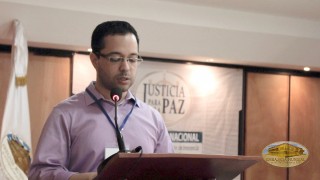
For his part, Dr. Camilo Montoya Reyes, Magistrate of the Superior Council of the Judiciary, said that a culture of peace should be created, targeting victims of crime and that victims have the right to justice, truth, reparation and the guarantee of non-repetition.
In her speech, Dr. Angela Rodríguez Saavedra, a professor at the University of Magdalena, said:
“The need for justice is an imperative of all, not a specific group, a specialized adaptive model must be established, involving new social, economic, political and religious factors that are rooted in societies, so that a true transitional justice can be achieved and not a simple transition from one model of justice to another.”
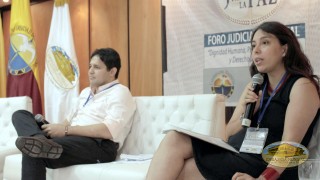
At the end of the speeches, a panel was held, which raised a question about the characteristics that transitional justice should bring together in the context of post-conflict Colombia.
Dr. Enriquez, in his response, considered
"Colombia needs a model that incorporates all the mechanisms of truth, justice, reparation and guarantee of non-repetition; it shares not only the criminal but an adequate balance that guarantees the rights of the parties, to ensure a lasting and stable peace.”
In response to the same question, Dr. Rodriguez indicated that the most important thing is the reform of the State.
“If we continue talking about social inequality and violating rights, conflicts will continue,” he expressed.
Dr. Camilo Montoya, when speaking, emphasized that the “Peace Court” must be an independent tribunal, because “justice without independence is not justice. There must be justice with autonomy and effectiveness,” he said.
The forum promoted by way of conclusion that transitional justice has the extraordinary but arduous function of achieving a balance between doing justice and negotiating peace, based on reconciliation, truth, the procedure of the perpetrators, but with an emphasis on the reparation and the rights of victims; through a malleable model that responds to the causes of the conflict.
These events that the GEAP develops in the judicial area, have already been carried out in the Colombian Republic with the Supreme Court of Justice, the National Navy, the Naval Force, the National Police, the Army, the College of Judges and Lawyers, and others organisms that have to do with work in the justice sector.
